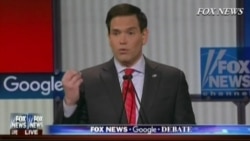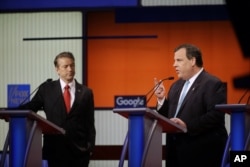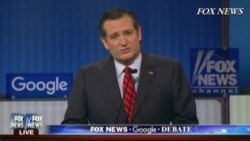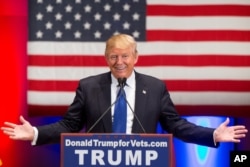Without Republican front-runner Donald Trump at center stage, the seven Republican candidates who participated in Thursday night's main debate were able to delve more deeply into issues such as immigration and U.S. foreign policy.
Texas Senator Ted Cruz and Florida Senator Marco Rubio, who are polling in the double-digits behind Trump, exchanged several heated exchanges throughout the night.
Former Florida Governor Jeb Bush, who has had several lackluster debate performances and is a frequent target of Trump's barbs, seemed more relaxed Thursday and engaged in a few quick retorts with Rubio as well.
One of the lengthiest exchanges of the night occurred when Fox News moderator Megyn Kelly, using video clips of previous statements, questioned several candidates regarding their seeming flip-flops on the immigration issue.
WATCH: Candidates on national security
Rubio campaigned for the Senate in 2010 on a tough immigration stance, saying he would never support blanket amnesty. He later became part of a bipartisan group of senators called the “gang of eight,” who crafted a comprehensive immigration bill in 2013 that contained a pathway to citizenship. The bill passed in the Senate but failed in the House of Representatives.
In a testy exchange with Kelly, Rubio denied he had changed his position on immigration issues, easily one of the most contentious among the Republican candidates. “What I’ve always said is this issue needs to be solved,” he said.
He said while he’s not for deporting the millions of undocumented immigrants in the U.S. -- as Trump has suggested he would do -- “we’re not for handing out citizenship either.”
Bush attacked Rubio, saying the senator had sought his support as governor on legislation that would allow a pathway to citizenship. But "then he cut and run because it wasn't popular with conservatives," he chided.
Rubio fired back, saying Bush "used to support" a path to citizenship.
The former governor responded: "So did you, Marco."
Attacks on Cruz
Cruz also had to answer video clips that showed him saying he would support immigration reform legislation, if some of the amendments he had offered were approved.
He denied he had changed his position, saying his amendments were not to fix all of the legislation's problems but to ensure undocumented immigrants in the U.S. couldn't gain legal status.
Cruz's reply brought attacks from both Kentucky Senator Rand Paul and Rubio. They accused Cruz of trying to position himself as the only "true" conservative on the immigration issue, and painting the other candidates as "for amnesty."
Throughout the debate, Fox, which partnered with Google for the event, also posed questions to the candidates from average Americans.
One such question came from Dulce Candy, an Iraq war veteran who was brought to this country from Mexico as a child.
Appearing via YouTube, Candy asked how immigrants should feel welcome in this country, given the harsh rhetoric regarding immigrants and refugees by the party's candidates during the past few months.
Bush responded, saying Candy "deserves our respect," while Rubio, again calling for reforming the immigration system, told her, "we will always celebrate legal immigration."
Foreign policy, national security
According to Google, ISIS – an acronym for the Islamic State group -- was by far the most searched foreign policy topic over the past year.
Google also said its searches reflecting the question “Is America safe?” have increased 400 percent since 2008, leading to questions posed about the candidates' views on foreign policy and national security.
Rubio and Paul had a heated exchange over how far the government can go in anticipating domestic terrorism.
Rubio, warning the U.S. faces an unprecedented threat from the Islamic State group, said he would go after terrorists "wherever they are" and if caught, "we're sending them to Guantanamo," referring to the detention center for prisoners in Cuba.
He has called for shutting down mosques, which he said are being used to radicalize terrorists.
Paul called Rubio’s plan a “wrong idea. ... If you want to defend the country, it begins with border security."
NSA, bulk data collection
A Libertarian, Paul has been one of the most vocal opponents of the National Security Agency's bulk data phone collection program, a program that Rubio supports.
"When I’m president, we are going to rebuild our intelligence capabilities. And they’re going to tell us where the terrorists are. And a rebuilt U.S. military is going to destroy these terrorists," Rubio said.
Paul sought to rebut the statement, saying, "The bulk collection of your phone data, the invasion of your privacy did not stop one terrorist attack. I don’t think you have to give up your liberty for a false sense of security."
New Jersey Governor Chris Christie, who shared a personal tale from the 2001 terror attacks in New York, again voiced his support for the NSA's collection program.
Bush, whose brother former President George W. Bush involved the U.S. in wars in Iraq and Afghanistan, called for establishing a no-fly zone in Syria as well as creating safe zones for dealing with refugees from the conflict.
WATCH: Talking about the 'elephant not in the room'
Ohio Governor John Kasich said to win the battle against IS would require a coalition of allies in the Arab world as well as Europe, a coalition similar to one the U.S. established "when we went to the first Gulf War."
Retired neurosurgeon Ben Carson, who has seen his popularity among potential Republican voters slip in recent polls, was asked a general foreign policy question -- what would he do, if elected president, if Russian forces invaded NATO ally Estonia?
"Look, first of all, I recognize that Vladimir Putin is an opportunist and he’s a bully, and we have to face him down ... face him down in that whole region, the whole Baltic region," Carson said. "I think we need to put in some armored brigades there. ... We need to be doing military exercises if not only Estonia but Latvia and Lithuania. They’re terrified by the saber rattling. I think we ought to put in our missile defense system."
He also referenced the conflict in Ukraine, where pro-Russian forces control territory in the east and where Russia annexed Crimea in 2015, suggesting the U.S. should arm Kyiv forces.
Two debates
Because of the large number of candidates — 11 — host Fox News split the debates in Des Moines, Iowa, between the seven candidates leading polls and the four bringing up the rear.
Earlier Thursday, former Pennsylvania Senator Rick Santorum, former business executive Carly Fiorina, former Arkansas Governor Mike Huckabee and former Virginia Governor Jim Gilmore participated in the "undercard" debate.
At the start of the main debate, several of the candidates chided Trump for missing the debate after Kelly offered them the opportunity to address “the elephant not in the room.”
Trump boycotted Thursday's debate after FOX News refused to prevent anchor Kelly from moderating the event. The billionaire developer has been feuding with Kelly since an August debate where she asked him about slurs he has made over the years about women.
Trump rally
Trump held a separate event at Drake University for U.S. veterans that coincided with the GOP debate. He said he decided not to appear “out of respect for myself. ... I wanted to be at the debate tonight, but you have to stick up for what’s right."
He told the crowd gathered at his rally: "When you're treated badly, you have to stick up for your rights," adding that "we have to stick up for our country if we're being mistreated."
Trump said his foundation already has raised $5 million for America’s vets. He said he's putting up $1 million of his own money, and that many of his wealthy friends are giving large contributions as well.
Huckabee and Santorum showed up at the Trump event. Each was invited by Trump to speak briefly.












